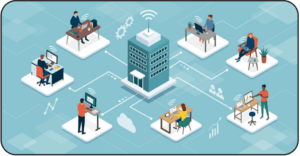Employers are adapting the health and wellbeing support they offer to employees in light of new remote and hybrid working patterns, according to new research* from GRiD.
A third (30%) of organisations where some or all staff now work remotely or in a hybrid model have made it easier for staff to access existing support and benefits remotely e.g. via apps and online.
Also in response to the remote work/hybrid working model, research showed that 28% have introduced new health and wellbeing benefits to support employees e.g. for their mental health and physical health.
Just over a fifth (22%) have increased support that can be accessed remotely e.g. virtual GP appointments, and the same number have organised more social events.
Katharine Moxham, spokesperson for GRiD, said: “It’s good to see that some employers are making adjustments to reflect that their employees are working remotely or have adopted a hybrid approach to their working location, but this new world is here to stay, and we’d like to see more employers stepping up. Offering access to virtual physiotherapy consultations or remote mental health appointments is not a thing of the future, it’s readily available now and needs to be on the health and wellbeing menu for all employees.”
The organisation added that for employers it is ‘vital’ to continually review the support they offer and how it is delivered, to meet the changing needs of their staff, with those who have already made steps to alter their health and wellbeing support finding that it may need further adaptions as staff make different choices about how they work in the future.
Supporting the four pillars of health and wellbeing
 Employers are also told to ‘ensure’ that any enhancements they make to their benefits to reflect changes in working patterns, supports all of the four pillars of health and wellbeing: physical, mental, financial and social health.
Employers are also told to ‘ensure’ that any enhancements they make to their benefits to reflect changes in working patterns, supports all of the four pillars of health and wellbeing: physical, mental, financial and social health.
GRiD added that the four are ‘intrinsically linked’ meaning where a staff member has a specific issue in one area, they may also have concerns in another, with holistic support needing to ‘underpin’ all health and wellbeing programmes.
Impact of hybrid working on health and wellbeing
From the research, 67% of employers claim to measure the impact of hybrid working on the health and wellbeing of their staff. Of these:
- 54% measure productivity
- 52% measure employee engagement and feedback
- 46% measure staff retention
- 40% measure rates of absence
- 29% measure referrals/signposting to support services and insurance (such as an Employee Assistance Programme, Private Medical and Group Income Protection Insurance, vocational rehabilitation, etc.)
- 28% measure their ability to recruit
- 27% measure utilisation rates of support services and insurance (such as an Employee Assistance Programme, Private Medical and Group Income Protection Insurance, vocational rehabilitation, etc)
Employers who do not measure, said the organisation, ‘cannot begin to understand’ how hybrid working is impacting their staff nor evidence whether any investment in health and wellbeing benefits is having a positive impact.
Katharine added: “Ignorance is not bliss. Every employer needs a benchmark from which to monitor the progress of their health and wellbeing programme, and more importantly, whether it is delivering successful outcomes for staff.
“Some employers tackled support for home workers quickly, but these findings show that others are still getting to grips with making modifications to health and wellbeing benefits and their measurement. It’s undoubtedly a challenge and will continue to be so as working practices ebb and flow. However, an employer who doesn’t move with the times is not supporting the health and wellbeing of their staff as well as they could.”
*The research was undertaken by Opinium from 9-22 January 2023 among 503 HR decision-makers and from 10-13 January 2023 amongst 1,212 employees at UK businesses.
What makes us susceptible to burnout?
In this episode of the Safety & Health Podcast, ‘Burnout, stress and being human’, Heather Beach is joined by Stacy Thomson to discuss burnout, perfectionism and how to deal with burnout as an individual, as management and as an organisation.
We provide an insight on how to tackle burnout and why mental health is such a taboo subject, particularly in the workplace.

 Employers are also told to ‘ensure’ that any enhancements they make to their benefits to reflect changes in working patterns, supports all of the four pillars of health and wellbeing: physical, mental, financial and social health.
Employers are also told to ‘ensure’ that any enhancements they make to their benefits to reflect changes in working patterns, supports all of the four pillars of health and wellbeing: physical, mental, financial and social health.